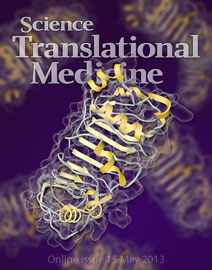Sci TM:揭示化疗如何引起女性癌症患者不孕
2013-05-17 koo 生物360
一项新的研究揭示了化疗如何在女性癌症患者中引起不孕,该研究还发现了一种叫做AS101的药物可在治疗期间使卵巢中的卵子储备免受损害。 卵泡是细胞集簇,其中每个卵泡都含有一个卵母细胞或卵子。每个月,这些卵泡中有少数会开始生长和成熟,它们会经历若干阶段直至每个月有一个卵泡达到完全成熟并排卵。随着妇女年龄的增长,静息状态的卵泡数连同卵巢中的卵子供应量会持续地下降。 众所周知,像化疗和放疗等常见的治疗会
一项新的研究揭示了化疗如何在女性癌症患者中引起不孕,该研究还发现了一种叫做AS101的药物可在治疗期间使卵巢中的卵子储备免受损害。
卵泡是细胞集簇,其中每个卵泡都含有一个卵母细胞或卵子。每个月,这些卵泡中有少数会开始生长和成熟,它们会经历若干阶段直至每个月有一个卵泡达到完全成熟并排卵。随着妇女年龄的增长,静息状态的卵泡数连同卵巢中的卵子供应量会持续地下降。
众所周知,像化疗和放疗等常见的治疗会破坏卵泡并引起不孕,但这种情况是如何发生的仍是一个谜。
在这项最新研究中,科学家发现,化疗——尤其是一种叫做环磷酰胺的药物——会干扰控制静息卵泡生长的自然平衡,从而引起一个过度活跃和生长的过程。
一旦这些卵泡开始生长,它们就踏上了一条以死亡告终的不归路。当过多的卵泡被激活,卵子库存就会随之被“耗尽”。环磷酰胺还会杀死活跃生长的卵泡——造成一种双重打击。
研究人员发现,一种叫做AS101的药物可防止小鼠卵泡的耗竭。在化疗同时给予小鼠AS101可在它们的卵巢中保留比那些仅给予化疗的小鼠更多的卵泡。
当这些小鼠在化疗后交配时,那些在接受化疗时同时接受AS101的小鼠与那些没有接受过化疗的小鼠有着类似的妊娠数和产下的幼仔数。AS101看来不会损害化疗的有效性。实际上,即使是在阻断化疗药物对卵巢的破坏性影响的同时,AS101似乎也具有抗癌功效并能让肿瘤细胞对化疗药物变得敏感。这些结果暗示,AS101可能对保护癌症病人的生育能力有裨益。

Abstract
Premature ovarian failure and infertility are major side effects of chemotherapy treatments in young cancer patients. A more thorough understanding of the mechanism behind chemotherapy-induced follicle loss is necessary to develop new methods to preserve fertility in these patients. We show that the alkylating agent cyclophosphamide (Cy) activates the growth of the quiescent primordial follicle population in mice, resulting in loss of ovarian reserve. Despite the initial massive apoptosis observed in growing, though not in resting, follicles of Cy-treated mice, differential follicle counts demonstrated both a decrease in primordial follicles and an increase in early growing follicles. Immunohistochemistry showed that granulosa cells were undergoing proliferation. Analysis of the phosphatidylinositol 3-kinase signaling pathway demonstrated that Cy increased phosphorylation of proteins that stimulate follicle activation in the oocytes and granulosa cells. Coadministration of an immunomodulator, AS101, reduced follicle activation, thereby increasing follicle reserve and rescuing fertility after Cy, and also increased the efficacy of Cy against breast cancer cell lines. These findings suggest that the mechanism in Cy-induced loss of ovarian reserve is accelerated primordial follicle activation, which results in a “burnout” effect and follicle depletion. By preventing this activation, AS101 shows potential as an ovarian-protective agent, which may be able to preserve fertility in female cancer patients.
本网站所有内容来源注明为“梅斯医学”或“MedSci原创”的文字、图片和音视频资料,版权均属于梅斯医学所有。非经授权,任何媒体、网站或个人不得转载,授权转载时须注明来源为“梅斯医学”。其它来源的文章系转载文章,或“梅斯号”自媒体发布的文章,仅系出于传递更多信息之目的,本站仅负责审核内容合规,其内容不代表本站立场,本站不负责内容的准确性和版权。如果存在侵权、或不希望被转载的媒体或个人可与我们联系,我们将立即进行删除处理。
在此留言








#癌症患者#
58